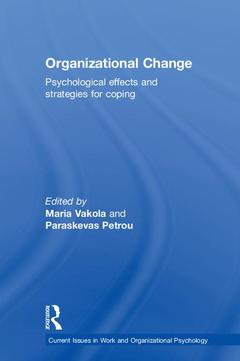Organizational Change Psychological effects and strategies for coping Current Issues in Work and Organizational Psychology Series
Coordonnateurs : Vakola Maria, Petrou Paraskevas

Organizational change is a reality of 21st-century working life, but what psychological effects does it have on individual workers, and what coping strategies can be used to mediate its impact? In today?s turbulent work and career environment, employees are required not only to accept changes as passive recipients, but to proactively initiate changes and demonstrate attitudes, behaviours and skills valued by current employers. As a result, organizational psychologists, both researchers and practitioners, have had to acknowledge and understand the myriad of challenges faced by employees as a result of organizational change.
In this important new book, an international range of prominent scholars examine the key psychological issues around organizational change at the individual level, including:
- health and well-being
- stress and emotional regulation
- performance and leadership
- attitudes and implications for the psychological contract
Analyzing and presenting the impact of organizational change, and possible coping strategies to successfully manage change, the volume is ideal for students and researchers of work and organizational psychology, business and management and HRM.
1. An overview of the impact of organizational change on individuals and organizations: An introductory note Maria Vakola (Athens University of Economics and Business), Paraskevas Petrou, (Erasmus University Rotterdam)Resources as change facilitators 2. Organizational Change and Employee Functioning: Investigating Boundary Conditions Victoria Bellou, (University of Thessaly, Greece), Despoina Xanthopoulou, (Aristotle University of Thessaloniki, Greece), Panagiotis Gkorezis, Hellenic (Open University and Open University of Cyprus) 3. Change consultation during organizational restructuring: Buffering and exacerbating effects in the context of role stress Nerina L. Jimmieson and Michelle K. Tucker (Queensland University of Technology, Australia) 4. Individual and external coping resources as predictors of employees’ change attitudes Alannah E. Rafferty (University of New South Wales, Australia), Nerina L. Jimmieson (Queensland University of Technology, Australia)Emotions and Cognitions and Change Outcomes 5. Feelings about change: The role of emotions and emotion regulation for employee adaptation to organizational change Karen van Dam (Open University, The Netherlands) 6. How workers’ appraisals of change influence employee outcomes Professor Karina Nielsen (Norwich Business School, University of East Anglia, UK) 7. Dynamics of trust and fairness during organizational change: implications for job crafting and work engagement 8. Organizational Change: Implications for the Psychological Contract Maria Tomprou (Carnegie Mellon, US), Samantha D. Hansen (University of Toronto, Canada) 9. Measuring Change Recipients’ Reactions: The Development and Psychometric Evaluation of the CRRE Scale Tsaousis Ioannis and Maria VakolaOrganizational-level and team-level facilitators of change 10. Destructive uncertainty: The toxic triangle, implicit theories and leadership identity during organizational change Pedro Neves (Nova School of Business and Economics, Portugal), Birgit Schyns (Durham University, UK) 11. Organizational change and health: The specific role of job insecurity Birgit Köper (Federal Institute of Occupational Safety and Health, Germany)Alexandra Michel (University of Heidelberg, Germany) 12. Improving our understanding of collective attitudes towards change formation Gavin Schwarz (University of New South Wales, Australia),Dave Bouckenooghe (Brock University, Canada)
Date de parution : 04-2018
15.6x23.4 cm
Date de parution : 04-2018
15.6x23.4 cm
Disponible chez l'éditeur (délai d'approvisionnement : 14 jours).
Prix indicatif 50,12 €
Ajouter au panierThème d’Organizational Change :
Mots-clés :
High Performance Work Practices; Transactional Stress Theory; uncertainty; COR Theory; coping; Quantitative JI; emotional regulation; Job Demand Resources Model; adaptation; Change Recipients; health; Qualitative JI; well-being; Emotional Exhaustion; psychological contract; Dispositional Resistance; toxic; Job Crafting; leadership; stress; Change Consultation; self-management; Negative Relationship; resilience; TPA; job security; Toxic Triangle; redundancy; Psychological Contract Breach; Maria Vakola; Psychological Contract Obligations; Paraskevas Petrou; Fairness Perceptions; Victoria Bellou; Employee Strain; Despoina Xanthopoulou; Job Resource; Panagiotis Gkorezis; Increased Work Engagement; Nerina L; Jimmieson; Individual Change Attitudes; Michelle K; Tucker; Cognitive Weariness; Alannah E; Rafferty; Change Self-efficacy; Karen van Dam; Low Core Self-evaluations; Karina Nielsen; Janne Kaltiainen; Jukka Lipponen; Maria Tomprou; Samantha D; Hansen; Ioannis Tsaousis; Pedro Neves; Birgit Schyns; Birgit Thomson; Alexandra Michel; Gavin Schwarz; Dave Bouckenooghe



